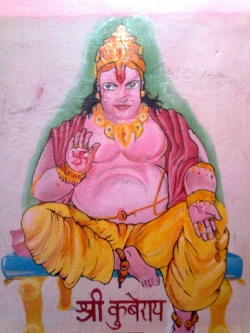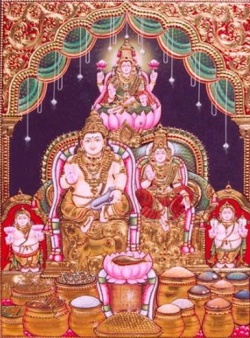Vessavana
Vessavana
One of the names of Kuvera, given to him because his kingdom is called Visānā (D.iii.201; SnA.i.369, etc.).
He is one of the Cātummahārājāno and rules over the Yakkhas, his kingdom being in the north (E.g., D.ii.207).
In the Ātānātiya Sutta he is the spokesman, and he recited the Ātānātiya-rune for the protection of the Buddha and his followers from the Yakkhas who had no faith in the Buddha. D.iii.194; he was spokesman because "he was intimate with the Buddha, expert in conversation, well trained" (DA.iii.962).
He rides in the Nārīvāhana, which is twelve yojanas long, its seat being of coral.
His retinue is composed of ten thousand crores of Yakkhas. (SnA..i.379; the preacher’s seat in the Lohapāsāda at Anurādhapura was made in the design of the Nārīvāhana, Mhv.xxvii.29).
He is a sotāpanna and his life span is ninety thousand years (AA.ii.718).
The books record a conversation between him and Velukantakī Nandamāta, when he heard her sing the Parāyana Vagga and stayed to listen.
When Cūlasubhaddā wished to invite the Buddha and his monks to her house in Sāketa, and felt doubtful about it, Vessavana appeared before her and said that the Buddha would come at her invitation (AA.ii.483).
On another occasion (A.iv.162; on his way to see the Buddha) he heard Uttara Thera preaching to the monks in Dhavajālikā on the Sankheyya Mountain, near Mahisavatthu, and went and told Sakka, who visited Uttara and had a discussion with him.
Once when Vessavana was travelling through the air, he saw Sambhūta Thera wrapt in samādhi.
Vessavana descended from his chariot, worshiped the Thera, and left behind two Yakkhas with orders to wait until the Elder should emerge from his trance.
The Yakkhas then greeted the Thera in the name of Vessavana and told him they had been left to protect him.
The Elder sent thanks to Vessavana, but informed him, through the Yakkhas, that the Buddha had taught his disciples to protect themselves through mindfulness, and so further protection was not needed.
Vessavana visited Sambhūta on his return, and finding that the Elder had become an arahant, went to Sāvatthi and carried the news to the Buddha.
ThagA.i.46f. Just as he encouraged the good, so he showed his resentment against the wicked; see, e.g., Revatī.
Mention is made of Vessavana's Gadāvudha* and his mango tree, the Atulamba**. Alavaka's abode was near that of Vessavana (SnA..i.240).
* SnA.i.225; the books (e,g., SA.i.249; Sp.ii.440) are careful to mention that he used his Gadāvudha only while he was yet a puthujjana.
** J. iv.324, also called Abbhantaramba (see the Abbharantara Jātaka).
Bimbisāra, after death, was born seven times as one of the ministers (paricaraka) of Vessavana, and, while on his way with a message from Vessavana to Virūlhaka, visited the Buddha and gave him an account of a meeting of the devas which Vessavana had attended and during which Sanankumāra had spoken in praise of the Buddha and his teachings (D.ii.206f).
Vessavana seems to have been worshiped by those desiring children.
See, e.g., the story of Rājadatta (ThagA.ii.403).
There was in Anurādhapura a banyan tree dedicated as a shrine to Vessavana in the time of Pandukābhaya (Mhv.X.89).
Vessavana is mentioned as having been alive in the time of Vipassī Buddha.
When Vipassī died, there was a great earthquake which terrified the people, but Vessavana appeared and quieted their fears (ThagA.ii.149). Vessavana accompanied Sakka when he showed Moggallāna round Vejayanta pāsāda. M.i.253; because he was Sakka's very intimate friend (MA.i.476).
As lord of the Yakkhas, it was in the power of Vessavana to grant to any of them special privileges, such as the right of devouring anyone entering a particular pond, etc.
See, e.g., DhA.iii.74; J. i.128; iii.325 (Makhādeva).
Sometimes, e.g., in the case of Avaruddhaka (DhA.ii.237), a Yakkha had to serve Vessavana for twelve years in order to obtain a particular boon (cf. J.ii.16,17).
(Three years at J. iii.502.)
Vessavana some times employs the services of uncivilized human beings (paccantamilakkhavāsika) DA.iii.865f.
The Yakkhas fear him greatly. If he is angry and looks but once, one thousand Yakkhas are broken up and scattered "like parched peas hopping about on a hot plate" (J.ii.399).
This was probably before he became a sotāpanna.
Vessavana, like Sakka, was not the name of a particular being, but of the holder of an office.
When one Vessavana died, Sakka chose another as his successor.
The new king, on his accession, sent word to all the Yakkhas, asking them to choose their special abodes (J.i.328).
It was the duty of Yakkhinīs to fetch water from Anotatta for Vessavana's use.
Each Yakkhinī served her turn, sometimes for four, sometimes for five months.
But sometimes they died from exhaustion before the end of their term. (DhA.i.40; also J. iv.492; v.21).
Vessavana's wife was Bhuñjatī (q.v.), who, like himself, was a devoted follower of the Buddha (D.ii.270).
They had five daughters: Latā, Sajjā, Pavarā, Acchimatī, and Sutā. For a story about them, see VvA.131f.
Punnaka was Vessavana's nephew. J. vi.265, 326.
The pleasures and luxuries enjoyed by Vessavana have become proverbial.
See, e.g., Vv.iv. 3, 46 (bhuñjāmi kāmakāmī rājā Vessavano yathā); MT. 676 (Vessavanassa rājaparihārasadisam); cf. J. vi.313.
An ascetic named Kañcanapatti (J.ii.399) is mentioned as having been the favourite of Vessavana.
See also Yakkha.

